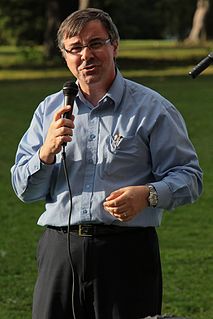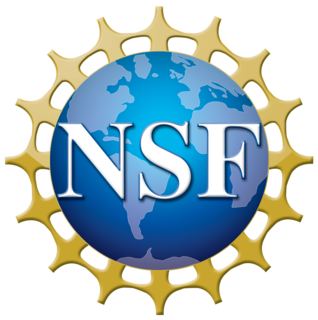
The American Society for Engineering Education (ASEE) is a non-profit member association, founded in 1893, dedicated to promoting and improving engineering and engineering technology education. The purpose of ASEE is the advancement of education in all of its functions which pertain to engineering and allied branches of science and technology, including the processes of teaching and learning, counseling, research, extension services and public relations.
Jim Kurose is a Distinguished University Professor in the College of Information and Computer Sciences at the University of Massachusetts Amherst.

Pramod P. Khargonekar is the Vice Chancellor for Research and Distinguished Professor of Electrical Engineering and Computer Science at the University of California, Irvine. An expert in control systems engineering, Dr. Khargonekar has served in a variety of administrative roles in academia and federal funding agencies. Most recently, he served as Assistant Director for Engineering at the National Science Foundation (2013-2016), and as Deputy Director for Technology at the Advanced Research Projects Agency – Energy. From 2001 through 2009 he was the Dean of the College of Engineering at the University of Florida.
The George E. Brown, Jr. Network for Earthquake Engineering Simulation (NEES) was created by the National Science Foundation (NSF) to improve infrastructure design and construction practices to prevent or minimize damage during an earthquake or tsunami. Its headquarters were at Purdue University in West Lafayette, Indiana as part of cooperative agreement #CMMI-0927178, and it ran from 2009 till 2014. The mission of NEES is to accelerate improvements in seismic design and performance by serving as a collaboratory for discovery and innovation.
The National Science Foundation Graduate Research Fellowship Program (NSF-GRFP) is an annual grant awarded by the National Science Foundation to approximately 2,000 students pursuing research-based Master's and doctoral degrees in the natural, social, and engineering sciences at US institutions. The fellowship provides an honorarium of $12,000 to be placed towards the cost of tuition and fees at the university the fellow attends; it also awards the student directly with an annual $34,000 stipend for three years. Each recipient could previously apply for a one time only travel award for $1,000. This travel award was previously for international research activities or presenting at an international scientific conference. However, in 2010, this opportunity was converted to the Nordic Research Opportunity, which is intended to facilitate collaborations between U.S. graduate fellows and scholars at Finnish, Swedish, Danish, and Norwegian research institutions.
Janet L. Kolodner is an American cognitive scientist and learning scientist and a retired Regents' Professor in the School of Interactive Computing, College of Computing at the Georgia Institute of Technology. She was Founding Editor in Chief of The Journal of the Learning Sciences and served in that role for 18 years. She was Founding Executive Officer of the International Society of the Learning Sciences (ISLS). From August, 2010 through July, 2014, she was a program officer at the National Science Foundation and headed up the Cyberlearning and Future Learning Technologies program. Since finishing at NSF, she is working toward a set of projects that will integrate learning technologies coherently to support disciplinary and everyday learning, support project-based pedagogy that works, and connect to the best in curriculum for active learning. Currently, she is a Visiting Professor at the Lynch School of Education at Boston College.
The America Creating Opportunities to Meaningfully Promote Excellence in Technology, Education, and Science Act of 2007 or America COMPETES Act was authored by Bart Gordon and signed by President George W. Bush; it became law on 9 August 2007. This was an Act, "To invest in innovation through research and development, and to improve the competitiveness of the United States."
The Computing Community Consortium (CCC) is an organization whose goal is to catalyze and empower the U.S. computing research community to pursue audacious, high-impact research.

The Institute for Computational Sustainability (ICS), founded in 2008 with support from an Expeditions in Computing grant from the National Science Foundation, focuses on the newly emerging field of Computational Sustainability and aims to apply computational techniques to help solve some of the most challenging sustainability problems of our time. Its vision is that computer scientists can — and should — play a key role in increasing the efficiency and effectiveness in the way we manage and allocate our natural resources, while enriching and transforming Computer Science. The institute, headed by Carla Gomes, is a joint venture involving scientists from Cornell University, Bowdoin College, the Conservation Fund, Howard University, Oregon State University, and the Pacific Northwest National Laboratory.
The National Institute for Mathematical and Biological Synthesis is a research institute focused on the science of mathematics and biology, located on the University of Tennessee, Knoxville, campus. Known by its acronym NIMBioS, the Institute is a National Science Foundation (NSF) Synthesis Center supported through NSF's Biological Sciences Directorate via a Cooperative Agreement with UT-Knoxville, totaling more than $35 million over ten years. The Institute opened in September 2008, with additional support from the U.S. Department of Homeland Security and the U.S. Department of Agriculture.
Owen Astrachan is an American computer scientist and professor of the Practice of Computer Science at Duke University where he is also the department's Director of Undergraduate Studies. He is known for his work in curriculum development and methods of teaching computer science. He was one of the first National Science Foundation CISE Distinguished Education Fellows, and is a recipient of the ACM Outstanding Educator Award. He was the principal investigator on the multi-year NSF/College Board project that led to the release of the AP Computer Science Principles course and exam.

The College of Engineering and Physical Science (CEPS), formerly the College of Physical and Engineering Science, is one of the colleges at the University of Guelph located in Guelph, Ontario, Canada. In 1989, the Ontario Agricultural College (OAC) School of Engineering was merged with the College of Physical Sciences to become the CPES.

Edward D. "Ed" Lazowska is an American computer scientist. He holds the Bill & Melinda Gates Chair in the Paul G. Allen School of Computer Science & Engineering at the University of Washington.

The Mathematical Biosciences Institute (MBI) is an institution of higher learning affiliated with the Ohio State University in Columbus, Ohio. MBI received major funding from the National Science Foundation. The institute offers a vigorous program of research and education, and fosters the growth of an international community of researchers in the mathematical biosciences.

The Center for Sensorimotor Neural Engineering (CSNE) is an Engineering Research Center funded by the National Science Foundation to create devices to restore the body's capabilities for sensation and movement. The National Science Foundation has awarded the CSNE $~30 million since 2011.
Engineering Research Centers (ERC) are university-led institutions developed through the National Science Foundation (NSF) Directorate of Engineering. While ERCs are initially funded by the NSF, they are expected to be self-sustaining within 10 years of being founded. The Engineering Research Centers program was originally developed in 1984 with the mission of removing disparity between academic and industrial engineering applications. In this way, engineering students would, theoretically, be better prepared to enter the engineering workforce. As a result, the United States would gain a competitive advantage over other countries. There have been three generations of Engineering Research Centers. Each of these generations has been specifically designed to meet the dynamic engineering demands of the United States. Due to the limited amount of funding available for ERCs, the program is competitive; out of 143 proposals submitted in 2008, only 5 were awarded centers. Commercialization of academic research is one of the primary goals of NSF ERCs.

The National Center for Women & Information Technology (NCWIT) is a national non-profit organization that works to increase the meaningful participation of girls and women in computing. NCWIT was founded in 2004 by Lucinda (Lucy) Sanders,Telle Whitney, and Dr. Robert (Bobby) Schnabel. NCWIT is headquartered in Boulder, Colorado at the ATLAS Institute at the University of Colorado Boulder. Lucy Sanders, who was inducted into the Women in Technology International Hall of Fame in 2007, is the current CEO.
Xin Zhang is a Professor of Mechanical Engineering, Electrical & Computer Engineering, Biomedical Engineering, Materials Science & Engineering, and the Photonics Center at Boston University (BU). She received her Ph.D. from the Hong Kong University of Science and Technology (HKUST) in Mechanical Engineering. Prior to joining BU, she was a Postdoctoral Researcher and then a Research Scientist with the Massachusetts Institute of Technology (MIT). Her research interests are in the broad areas of Microelectromechanical systems (MEMS), Nanoelectromechanical systems (NEMS), and Metamaterial structures and devices. She is an Elected Fellow of the American Association for the Advancement of Science (AAAS), American Institute for Medical and Biological Engineering (AIMBE), American Society of Mechanical Engineers (ASME), Institute of Electrical and Electronics Engineers (IEEE), and The Optical Society (OSA), and Associate Fellow of the American Institute of Aeronautics and Astronautics (AIAA). In 2016, she was selected as the recipient of the IEEE Sensors Council Technical Achievement Award for "distinguished contributions to the field of micro/nanoelectromechanical systems, addressing a wide range of important problems in advanced materials, photonics and energy." In 2018, she was selected as the recipient of the Charles DeLisi Award and Distinguished Lecture, an honor that "recognizes faculty members with extraordinary records of well-cited scholarship, senior leaders in industry and extraordinary entrepreneurs who have invented and mentored transformative technologies that impact our quality of life, and provides the recipient with a public forum to discuss his or her work before the Boston University academic community and the general public." Dr. Zhang's translational research has also earned her 2018 Innovator of the Year award, bestowed annually by Boston University on a faculty member who “translates his/her world-class research into inventions and innovations that benefit humankind.” She served as associate chair for mechanical engineering graduate programs at Boston University from 2008 to 2011, and is now associate director of the Boston University Nanotechnology Innovation Center and director of both the National Science Foundation (NSF) Research Experiences for Undergraduates (REU) Site and the NSF Research Experiences for Teachers (RET) Site in Integrated Nanomanufacturing at Boston University.








